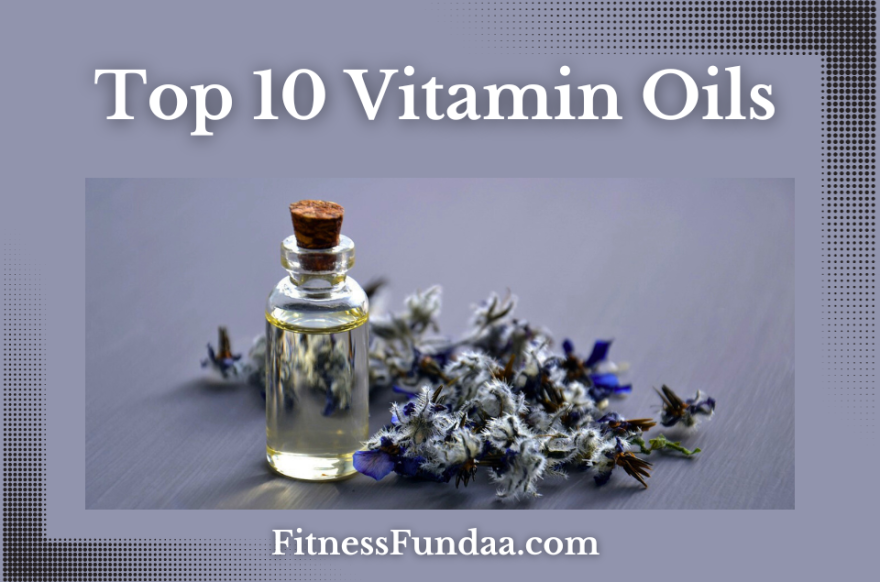Vitamin oils provide a significant amount of benefits in terms of skin, health, growth, etc with the help of their rich properties. In this article, we will explore about most 10 used vitamin oils that provide the maximum number of benefits. Vitamin Oils. Top 10 Vitamin Oils.
Here are the Top 10 Vitamin Oils:
-
Olive Oil:
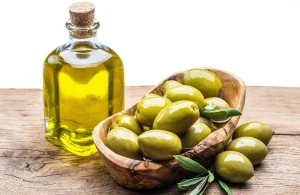
_image source : greendna.in
- Olive oil, rich in monounsaturated fats like oleic acid, supports heart health by reducing LDL cholesterol and increasing HDL cholesterol. It contains anti-inflammatory features which lowers the risk of various chronic diseases. Also, studies observed that it is beneficial for insulin sensitivity.
- This olive oil is a source of vitamin E, which further provides antioxidant protection, skin health, and also supports the immune system. You can include it in your diet, in salads, for sautéing, or in flavorful dipping sauces to reap its nutritional benefits. Olive oil, rich in heart-healthy monounsaturated fats like oleic acid, lowers LDL cholesterol and raises HDL cholesterol, reducing the risk of heart diseases.
-
Coconut Oil:
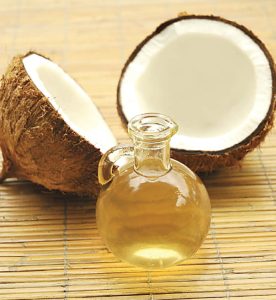
_image source : wikipedia.org
- Coconut oil’s uniqueness lies in its medium-chain triglycerides (MCTs). Studies suggest metabolic benefits, potentially aiding weight management. MCTs, crossing the blood-brain barrier, may offer cognitive benefits, but more research is needed. With antimicrobial lauric acid, coconut oil supports immune function. Despite its unique properties, moderation is crucial due to its high saturated fat content. Consult a healthcare professional for personalized advice, especially for specific health concerns or dietary restrictions.
- Coconut oil is a versatile essential for both culinary and skincare needs. In the kitchen, it’s an ideal cooking oil, adding a subtle coconut flavor to dishes and enhancing beverages. Beyond beauty, coconut oil is used in health practices like oil pulling and as a natural massage oil. It’s also employed in personal care applications such as a deodorant base, cuticle oil, and a smooth shaving cream alternative. While some use it topically for wound healing, scientific evidence in this regard is limited.x
-
Flax seed Oil:
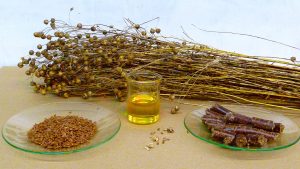
_image source : wikipedia.org
- Flaxseed oil is a valuable addition to a balanced diet due to its high content of omega-3 fatty acids, particularly alpha-linolenic acid (ALA), essential for heart health and associated with benefits like inflammation reduction and brain support.
- Flaxseed oil, rich in omega-3s like ALA, benefits heart health by lowering blood pressure and reducing LDL cholesterol. It also has anti-inflammatory properties which further help mitigate systemic inflammation. Including it in daily meals, such as drizzling over salads or adding to smoothies, offers convenient heart-healthy advantages. However, maintaining balance in the diet and consulting with a healthcare professional is crucial, especially for those with existing health conditions or taking medications.
-
Avocado Oil:

_image source : wikipedia.org
- Avocado oil, rich in heart-healthy monounsaturated fats and vitamin E, supports cardiovascular health by balancing cholesterol levels and provides antioxidant protection for skin and the immune system. Adding avocado oil to your diet, in cooking or as a drizzle, offers dual benefits for heart health and skin vitality. Moderation is crucial, and those with specific health concerns should consult a healthcare professional.
-
Almond Oil:
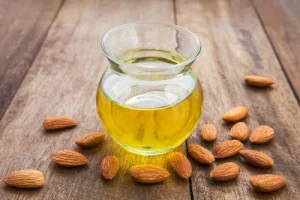
_image source : indiamart.com
- Almond oil, rich in vitamin E, serves as a potent antioxidant, protecting cells from oxidative stress. However, moderation is crucial due to its calorie density. Incorporating almond oil into skincare and culinary practices provides a versatile way to harness its vitamin E benefits, with caution for those with nut allergies and consultation with a healthcare professional for personalized recommendations.
-
Sunflower Oil:

_image source : wikipedia.org
- Sunflower oil boasts a high vitamin E content, a potent antioxidant protecting against oxidative damage. Its favorable unsaturated fat profile, rich in monounsaturated and polyunsaturated fats, particularly linoleic acid, supports overall health. With a mild flavor, sunflower oil is versatile in cooking, and suitable for frying, sautéing, and salad dressings. Its high smoke point prevents flavor alteration.
- The oil’s unsaturated fats, especially linoleic acid, may contribute to heart health by managing cholesterol levels, while its antioxidant properties can reduce oxidative stress. Moderation is key due to its calorie density. Incorporating sunflower oil into cooking offers a practical way to benefit from its nutritional profile, with consultation with a healthcare professional recommended for personalized dietary advice.
-
Fish Oil:
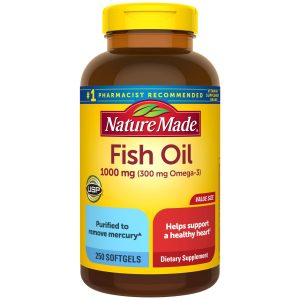
_image source: amazon.in
- Fish oil is rich in omega-3 fatty acids, including EPA and DHA, crucial for overall health. DHA, a key brain tissue component, supports cognitive function, reducing the risk of cognitive decline. Whether through fish or supplements, incorporating fish oil ensures a convenient intake of these essential fatty acids. However, consulting a healthcare professional is advised for individuals with specific health conditions before significant dietary changes or supplement use..
-
Argan Oil:

_image source : organicharvest.in
- Argan oil boasts high vitamin E and fatty acid content, promoting skin and hair health. Its antioxidant properties help in nourishing and moisturizing skin and further help in repairing and healing the skin. In hair care, argan oil adds shine, tames frizz, and promotes scalp health. Its versatility makes it a valuable natural remedy for dry skin, damaged hair, and overall beauty enhancement.
-
Walnut Oil:

_image source: baskinnature.in
- Walnut oil is notable for its high omega-3 fatty acid content, particularly alpha-linolenic acid (ALA).
-
Jojoba Oil:
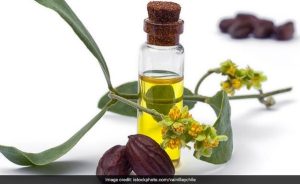
_image source : sportskeeda.com
- Jojoba oil is prized for its exceptional moisturizing properties, benefiting both skin and hair, Jojoba oil’s makeup closely imitates the natural oils of the skin, ensuring effective hydration without causing pore blockage. In skincare, it eases dryness, reduces inflammation, and balances oil production. When applied to hair, jojoba oil moisturizes, controls frizz, and boosts shine. Its adaptability in personal care routines makes it a non-greasy, nourishing choice for a range of beauty applications.
These oils play unique roles in promoting health and beauty. Olive oil supports cardiovascular well-being, coconut oil offers potential in weight management and cognitive function, and flaxseed oil aids heart health and reduces inflammation. Avocado oil benefits cardiovascular health and skin vitality, while almond oil serves as a potent antioxidant with caution for nut allergies.
Sunflower oil’s versatility supports heart health, fish oil emphasizes overall health and cognitive function, Argan oil acts as a natural remedy for skin and hair, walnut oil shows promise for heart health, and jojoba oil is a versatile, nourishing choice for personal care. Together, these oils provide a diverse range of benefits, enhancing our well-being when integrated into daily routines.
FAQs Answered
-
Why is olive oil considered heart-healthy?
Olive oil is rich in monounsaturated fats, like oleic acid, which helps support cardiovascular health by reducing LDL cholesterol and increasing HDL cholesterol. Additionally, its anti-inflammatory properties lower the risk of chronic diseases.
-
How can coconut oil aid in weight management and cognitive function?
Coconut oil contains medium-chain triglycerides (MCTs) that may support weight management, and these MCTs can potentially offer cognitive benefits by crossing the blood-brain barrier. However, more research is needed in this area.
-
What makes flaxseed oil a valuable ally for heart health?
Flaxseed oil is high in omega-3 fatty acids, particularly alpha-linolenic acid (ALA), which has been linked to reducing blood pressure and LDL cholesterol. Its anti-inflammatory properties further contribute to heart health.
-
What dual benefits does avocado oil offer?
Avocado oil, rich in monounsaturated fats and vitamin E, supports cardiovascular health by balancing cholesterol levels. Additionally, it provides antioxidant protection for the skin, promoting both heart health and skin vitality.
-
How does almond oil act as an antioxidant?
Almond oil, rich in vitamin E, serves as a potent antioxidant, protecting cells from oxidative stress. However, caution is advised for those with nut allergies.
-
What role does sunflower oil play in supporting heart health?
Sunflower oil, with its high vitamin E content and favorable fat profile, contributes to heart health by managing cholesterol levels. Its antioxidant properties also help reduce oxidative stress.
-
Why is fish oil emphasized for overall health and cognitive function?
Fish oil is rich in omega-3 fatty acids, including EPA and DHA, which are crucial for overall health. DHA, in particular, supports cognitive function, reducing the risk of cognitive decline.
-
How does Argan oil benefit skin and hair health?
Argan oil, known for its high vitamin E and fatty acid content, acts as a natural remedy for skin and hair. Its antioxidants nourish and moisturize the skin, aiding in repair and promoting scalp health.
-
What promise does walnut oil hold for heart health?
Walnut oil is notable for its high omega-3 fatty acid content, especially alpha-linolenic acid (ALA), making it potentially beneficial for heart health.
-
Why is jojoba oil considered versatile for personal care?
Jojoba oil’s exceptional moisturizing properties make it a versatile and nourishing choice for both skin and hair in personal care routines, offering benefits like reduced dryness and inflammation.
see also :Top 10 Face Serums for Women in 2024

